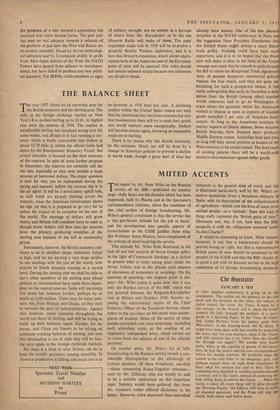THE BALANCE SHEET
THE year 1957 closed on an uncertain note for the British economy and the sterling area. The rally in the foreign exchange market on New Year's Eve pushed sterling up to $2.81, its highest rate since the autumn of 1956. The market in transferable sterling has remained strong now for some weeks; and Britain is in fact running a cur- rency which is freely convertible into dollars at about $2.79 (that is, within the official limits laid down by the International Monetary Fund). But critics' attention is focused on the slow recovery of the reserves. In spite of some further progress in December, the reserves are certainly still far too low, especially as they now include a large amount of borrowed dollars. The major question is how far they can be replenished during the spring and summer, before the autumn nip is in the air again. It will be a particularly uphill task, as chill winds are already blowing across the Atlantic, since the American Government shows no sign yet that it is prepared to go very far to soften the impact of its recession on the rest of the world. The shortage of dollars will grow worse, and Britain will somehow have to meet it, though fewer dollars will flow into the reserves from the primary producing countries of the sterling area because of the fall in commodity prices.
Fortunately, however, the British economy con- tinues to be in excellent shape. Industrial output is high, and we are earning a very large surplus in our dealings with the rest of the world, with exports to North America running at a record level. During the coming year we shall be able to carry other members of the sterling area whose policies or circumstances have made them depen- dent on the central reserves. India will inevitably run down her balances further, perhaps by as much as £100 million. There may be some pres- sure, too, from Malaya and Ghana, as they start to increase the pace of industrialisation. Against this, however, many countries throughout the world are short of sterling, and will be trying to build up their balances again. Europe, for in- stance, and China are known to be relying on minimum working balances of sterling, and now that devaluation is out of sight they will be buy- ing once again in the foreign exchange markets.
But there is a limit to what Britain can do to keep the world's payments running smoothly. In America production is falling, and much less is to be invested in 1958 than last year. A declining market within the United States means not only that the Americans buy less from overseas but also that businessmen there will try to push their goods into world markets more energetically. Dollars will become scarcer again, throwing an impossible strain on to sterling.
There is no reason why this should inevitably be the outcome. Much can still be done by a change in American policies to prevent a decline in world trade, though a great deal of time has surprises at the NATO conference in Paris was. the suggestion from President Eisenhower that the United States might pursue a more liberal trade policy. Nothing could have been more opportune, and it is to be hoped that the Presi- dent will make it clear in his State of the Union message next week that he intends to push through the Bill to renew the Reciprocal Trade Agreement Acts. At present American commercial policies weaken the free world, and they are quite un- becoming for such a prosperous nation. It was really unforgivable that early in December a dele- gation from the British (among other) woollen textile industries had to go to Washington to argue about the penalties which the Americans wished to impose as soon as imports of woollen goods exceeded 5 per cent. of American home output. As long as the Americans continue to', restrict imports of Dutch cheeses, Swiss watches, British bicycles, New Zealand dairy products, Middle Eastern cotton, Australian lead and zinc, so long will their moral position as leaders of the West continue to be compromised. The final result of existing policies there will be a world-wide return to discrimination against dollar goods.










































 Previous page
Previous page